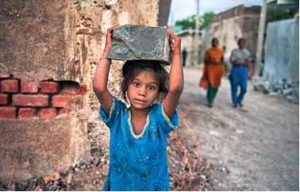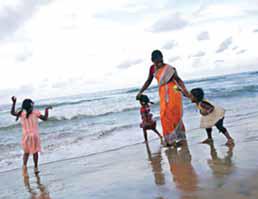The following article, which appeared in the reputed Maharashtra Police magazine ‘Dakshata’, is more relevant today than when it appeared some years ago. In fact, the in-depth analysis of different social strata of Indian society provides a deep insight into the ever-rising juvenile crime in every city. We reproduce here a translated version of the article originally written in Marathi.
 William Blake once said: “The unloved cannot be loved”; however we social activists, feel the urge to prove him wrong, under several circumstances.
William Blake once said: “The unloved cannot be loved”; however we social activists, feel the urge to prove him wrong, under several circumstances.
Our society withdraws from children, who have been deprived of dignity and are considered unwanted. It is necessary to infuse the minds of these children, with a sense of self-respect. Proper action towards this cause can work wonders to enlighten them. Children below 16 years of age should be taken special care by sensitizing their minds about our concern for their security and love for them.
In olden times, wealthy families took up to feed the needy students in their locality, at least once a week, thus, taking an initiative to fulfill their societal obligations, a practice unheard of these days. Under present circumstances, the government needs to step in to protect the rights of such children under the Bombay Juvenile Law.
A number of inventions have been made since 1800 as part of the Industrial Revolution. As a result, today we are living in a technology-driven era. The standard of living of individuals has gone up and along with it their sense of security, power and status in the society. As a matter of fact, the competition in the corporate world has left career-oriented parents hardly any time to spend with their kids. In this scenario of fast growing industrialization across the country, large chunks of rural population are drawn to cities in search of job opportunities and better livelihood. As a result, many joint families have crumbled.
Today, the crime rate in the society has been sky-rocketing, thanks to economic disparities and resultant social problems and perversities. Though these problems cannot be rooted out immediately, they can be controlled and prevented from further spreading across the society.
Lower Class: Inadequate housing facilities in our cities has led to the growth of slums, which are the breeding ground for criminals, sex workers, illicit liquor businesses, gamblers and all kinds of anti-social elements. Apart from them, there are people who are slightly better off financially but much backward culturally and living in the same areas. There is a tendency to earn easy money among children living in these areas by stealing or committing crimes. The glamour of making a quick buck draws them towards crime.
 The criminal mindset of these children is nurtured due to lack of education and deprivation of basic needs such as food, clothing and housing which are essential for a decent lifestyle. There is no doubt that social and economic disparities are man-made and steps to eradicate them have to be taken by government agencies and social workers. The primary responsibility here will be to educate the slum dwellers and emphasize the need to lead a decent life.
The criminal mindset of these children is nurtured due to lack of education and deprivation of basic needs such as food, clothing and housing which are essential for a decent lifestyle. There is no doubt that social and economic disparities are man-made and steps to eradicate them have to be taken by government agencies and social workers. The primary responsibility here will be to educate the slum dwellers and emphasize the need to lead a decent life.
For the parents of children in the above mentioned strata of society, responsibility of raising them ends merely with paying of their school fees, uniforms and books. Children here also lack in awareness about how they could utilize their spare time learning new skills or spend it fruitfully. Therefore, the boys indulge in their spare time in anti-social activities like eve-teasing or loitering at railway stations and public parks. Also, most juvenile crimes that occur in our society are copied from films that glorify violence, exploitation and corruption, which find expression in real life as well.
Middle Class – Juvenile crime in the middle class is way different. This strata of people can neither lead the life of slum dwellers nor can they compete with the upper classes of society. But they have a strong desire to achieve that standard. To fulfill these wishes both parents have to step out of their homes to earn money, which is at the cost of personal attention and love that the children need in their growing years. In-spite of deliberate intentions from parents to fulfill these aspects, circumstances are often too adverse. To nurture a child’s mental and emotional state of mind is the duty of society at large. Many a times, children are kept under strict discipline at home and are not given enough love and freedom to open up; as a result, the children get carried away easily when someone shows the slightest compassion and vent out their suppressed desires.
Upper Class – Children from the upper class of the society acquire a criminal bent of mindset due to lack of discipline and control in their daily lives. These children have a special place and standing in their family and they expect the same everywhere. When they do not get the same respect outside they are unable to cope with the disappointment. They try to get popular in their social circles by splurging money. Instances of wealthy children becoming ‘life members’ of colleges are not rare. They equate enjoyment with happiness and believe that money can buy anything, even real pleasure.
As a result of splurging on their enjoyment, the worry to earn more to fulfill their requirements gets compounded and hence the upper class children try every trick to make a quick buck. This leads them to making money through unethical means. Parents just do not bother to check how these children are using their pocket money. They tend to take care of the financial and physical needs of their children and thus overlook the importance of their emotional needs.
In many instances, it is observed how even educated parents are so indifferent about the future of their children. Children in the nursery classes are sent to tuitions, simply because mother has to either accompany father for parties or attend kitty parties or play rummy or bridge! Mother is the first’ Teacher’ which conveniently forgotten. These dyas it is obvious that if natural/inborn talent of children is not honed, they will grow just like an untended sapling.
The development of an individual, whether young or dependent, sick or elderly, is well taken care of emotionally, culturally and physically in a joint family setup. When parents are unable or reluctant to spend enough time with children, it affects them emotionally and results in emotional or physical disability, the instances of which are far low among children raised in a joint family.
Available statistical data enables us to analyze the rise in juvenile crime over the decade (1961-71), which can be blamed on industrialization, which in turn has given birth to more and more nuclear families. There is a marked difference in the incidents of juvenile crime that took place in 1971 as compared to those that happened in 1961. In all the three classes of society, the crime rate surged alarmingly, especially in Nagpur, Pune, Thane, Solapur, Vardha, Amravati and Jalgaon.
On carefully examining the data from 1965 to 1973, it is observed in a study of juvenile crime it is growing in nature. Children are engaged in gambling, thefts, dacoity, burglary, physical assault and rape even in small towns like Nashik, Ahmednagar, Akola, Aurangabad, Sangli, Nanded and Dhule. In gambling, Nagpur leads the list, even ahead of Mumbai, and Jalgaon. Criminals in illicit liquor trade are found mainly in Thane district, followed by Nagpur city and Kolhapur. Pune heads the list of robberies followed by Amravati & Akola. Jalgaon is a front–runner in dacoity followed by Thane district. Thane leads in murders followed by Nagpur. Pune rural also shows the similar numbers in the last five years of the study. In thefts, Thane follows Nagpur and in dacoities–Satara is followed by Nanded, Jalgaon & Aurangabad. Pune rural and Thane head the list in rape cases.
Duties & Preventive Measures
Duties of parents: Basically it is the duty of parents to ensure healthy conditions for the child’s growth. It is important to inculcate strong moral values among them from a very young age. Parents should be aware of the strength and weaknesses of their wards. It is  very important for us to secure the emotional quotient of the child with enough love and care. Between the ages of two and six, the kidneeds to be taught behavioral etiquettes to practice in the society. Parents need to be strict enough, and not pamper the child much; otherwise he or she will experience difficulty in facing the world. One need not be very critical but at the same time, a child should be made aware that he is answerable and accountable to his parents. Family is the replica of society. Behavior and adjustment with others are best taught at home.
very important for us to secure the emotional quotient of the child with enough love and care. Between the ages of two and six, the kidneeds to be taught behavioral etiquettes to practice in the society. Parents need to be strict enough, and not pamper the child much; otherwise he or she will experience difficulty in facing the world. One need not be very critical but at the same time, a child should be made aware that he is answerable and accountable to his parents. Family is the replica of society. Behavior and adjustment with others are best taught at home.
Unlike in the ancient times, nowadays we value our culture less, thanks mainly to globalization and westernization. In America, the institution of marriage is based on the contract system-it leads to marital problems which are unavoidable. In today’s India, we may not be observing the Vat–Savitri ‘vrata’, but we follow the American thoughts about the institution of marriage, then the ‘Banyan Tree’ also will be shaken and shall fall apart. That’s why parents need to be appropriate role models for their children. Studies conducted on children between the ages of 6 and 16 show that good up-bringing is the foundation of a child’s growth. Looking after your child with utmost care is the most important duty of any parent.
Duty of society
People from different walks of life constitute a society. Solidarity of the society is seen in their thought process. Society has undergone a sea change in many aspects after the First World War. Young generation was confused between the thought process and the reality. Society was unable to guide the youngsters as leaders themselves could not distinguish between good and bad. Politicians misguided them. As a result, the younger generation is confused and unable to take the right decisions. In fact today, youngsters are much more capable and intelligent. However, this intelligence needs to be chanellised and the youth need to be guided in the right direction. To achieve this three E’s are necessary:
• Electrify the country
• Educate the country
• Empower the country through job opportunities
The entire community must be provided with facilities to study. It is the duty of the society to create business and employment opportunities for its people, with state of the art infrastructure. More and more qualified people should take the lead and guide the youth. Wherever guidance or helping hand is required, it should be extended to them. Community leaders should go to the slums and discourage youngsters from juvenile crime by conducting ‘Balwadi’ and literacy classes. A government directive says that primary education is compulsory but the question remains as to what extent has it been implemented. Sound technical support can produce quality goods; the same principle can be applied to society.
Duty of Police
Police should monitor criminality and the spread of juvenile crime through legal and social initiatives. Initially, the job of police was to look for criminals and start investigations, but post-Independence, they have also been given the responsibility of taking preventive measures. Juvenile criminals and young perverts come in direct contact with the police force and in turn needs to be dealt with a lot of patience and confidence to counsel them back to the right path.
This job should be assigned to lady police officers, who can handle these children with patience and affection. They have to follow certain legal procedures in order to ensure that children are not pressurized. Police should be in civilian clothes when they are accompanying these children. It is important that these juvenile criminals should not be hand cuffed or put behind the bars; their names and photographs too should not be published. Police should take special care of other children, who come in regular contact with juvenile criminals and are hence most vulnerable and likely to follow them. They should also take charge of orphans, children who frequent red light areas and gambling joints, beggars and those whoever are on the wrong track and send them to remand homes.
Children who bunk schools and watch films are spotted and sent back to schools or home by the police so that they don’t lose track in rile. There are times when they face ridiculous situations, when parents ask them why are they bothered, if their child is watching a movie? It is difficult to convince these parents. Ticketless travelling is also common among juveniles and violators should be taken to task. Once I visited a remand home in Delhi and casually asked: ‘Is there anyone form Pune?’ and to my surprise one boy from Somwar Peth Pune raised his hand. It is often seen that when we catch these children they start howling, screaming and fall on our feet. At such times, the public gets agitated and the police personnel, instead of helping, start arguing with them. These children are very smart at gauging public emotion and scream even more in such situations. The public does not understand that it is important to nip wrongful tendencies early and that’s the reason that the police are taking charge of these children.
In India, juvenile perversity is not a crime. Roaming aimlessly and unsupervised, these children are mentally and physically weak because of the atmosphere at home and that is why it is essential to curb this tendency. An adverse situation at home compels them to leave the house. So the responsibility to send them to remand homes lies with the police.
Duty of Social Workers
When police take these children into custody under the provisions of the Children’s Welfare Act, these children are shifted to remand homes for security reasons and the detailed report of the home environment is submitted to the court and the child is kept under care at the remand home, till he or she completes 16 years. In some cases children are even kept till the age of 18. The ratio between the number of children and the staff should be well maintained. If the number of staff is increased, it will be easier to solve the children’s problems. Some parent–teacher associations are taking initiatives by helping the school be managed efficiently. Instead they should consider taking charge of such children who have been released from remand homes on bond and have gone to their parents.
 Without any guidance, it is difficult for such children to improve. It will be a great service to the society by the parent-teachers’ associations. Similarly, child guidance centres run by the public welfare department can also hire efficient staff. They can take the help of social workers too. In every city and village there are women’s groups that are functioning. They do not need any permission as 10-15 ladies gather together and start kitty groups or even play rummy. Instead, they should be given permission by the social welfare department or women’s councils and they should be allowed to be engaged in some fruitful activity. Our experience tells us that ladies while away their time, discussing sarees, jewellery, etc. They should shun these activities and do some meaningful work.
Without any guidance, it is difficult for such children to improve. It will be a great service to the society by the parent-teachers’ associations. Similarly, child guidance centres run by the public welfare department can also hire efficient staff. They can take the help of social workers too. In every city and village there are women’s groups that are functioning. They do not need any permission as 10-15 ladies gather together and start kitty groups or even play rummy. Instead, they should be given permission by the social welfare department or women’s councils and they should be allowed to be engaged in some fruitful activity. Our experience tells us that ladies while away their time, discussing sarees, jewellery, etc. They should shun these activities and do some meaningful work.
Children coming to the remand homes are evaluated through physical, mental and emotional parameters. According to the report, it would be beneficial for social workers to take over this job. Once a child commits a crime he should not be branded a criminal as he can be turned around with timely help, guidance and supervision. This can be done effectively through behavioral bonds that have been implemented/suggested by the legal machinery. This is, in fact, even prescribed in the Manusmriti – chapter 8, verse 126 & 129; a similar provision is seen in the Probation of Offenders Act, 1958 – section 360.
No one is a born criminal but circumstances compel an individual to take to crime, so each individual needs to take ownership for societal reform. ‘A stitch in time saves nine’ – So if this happens we can truly say that the unloved can indeed be loved.













